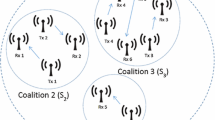Abstract
In selfish wireless cooperative multicast networks (WCMNs), a source node wants to achieve the optimal benefit (i.e., rate gain), while the relaying nodes are willing to get fairness rewards (i.e., rate gains) from the source for the cooperative relaying. In this paper, we implement these two different objectives for the source and the relays through the Pareto optimal resource allocation. Define the cooperative strategy of a node as the fraction of a data-frame that it is willing to contribute to its cooperative partners. Consider the rational decision made by one node will definitely affect its cooperative partners’ choice. Then, we can formulate this resource sharing problem as a Nash bargaining problem (NBP), and the Nash bargaining solution (NBS) to the NBP encapsulates the Pareto optimality naturally. Finally, to enable the nodes to be capable of computing the NBS cooperative strategies rapidly as the wireless channel changes, we propose a fast particle swarm optimizer (PSO) algorithm to search for the NBS. Simulation results show that the two specified objectives of the source and the relays can be implemented in the Pareto optimal sense, i.e., the source can achieve a significant performance gain in comparison with direct multicast and the relays can get a fair reward by the source according to the level of contribution it has made to improve the performance of the source.
Similar content being viewed by others
References
Yang D N, Chen M S. Efficient resource allocation for wireless multicast. IEEE Trans Mobile Comput, 2008, 7: 387–400
Zhao H, Su W F. Cooperative wireless multicast: performance analysis and power/location optimization. IEEE Trans Wirel Commun, 2010, 9: 2088–2100
Maric I, Yates R D. Cooperative multicast for maximum network lifetime. IEEE J Sel Area Comm, 2008, 23: 127–135
Niu B L, Jiang H, Zhao H V. A cooperative multicast strategy in wireless networks. IEEE Trans Veh Technol, 2010, 59: 3136–3143
Niu B L, Zhao H V, Jiang H. A cooperation stimulation strategy in wireless multicast networks. IEEE Trans Signal Proces, 2011, 59: 2355–2369
Jaramillo J J, Srikant R A game theory based reputation mechanism to incentivize cooperation in wireless ad hoc networks. Ad Hoc Netw, 2010, 8: 416–429
Yaiche H, Mazumdar R R, Rosenberg C. A game theoretic framework for bandwidth allocation and pricing in broadband networks. IEEE/ACM Trans Netw, 2000, 8: 667–678
Shi Y, Eberhart R C. A modified particle swarm optimizer. In: Proceedings of IEEE International Conference on Evolutionary Computation. Anchorage: IEEE Press, 1998. 69–73
Wang B, Han Z, Liu K J R. Distributed relay selection and power control for multiuser cooperative communication networks using Stackelberg game. IEEE Trans Mobile Comput, 2009, 8: 975–990
Cui S G, Goldsmith A J, Bahai A. Energy-efficiency of MIMO and cooperative MIMO techniques in sensor networks. IEEE J Sel Area Comm, 2004, 22: 1089–1098
Boyd S, Vandenberghe L. Convex Optimization. London: Cambridge University Press, 2004
Author information
Authors and Affiliations
Corresponding author
Rights and permissions
About this article
Cite this article
Zhang, G., Liu, P. & Ding, E. Pareto optimal time-frequency resource allocation for selfish wireless cooperative multicast networks. Sci. China Inf. Sci. 56, 1–8 (2013). https://doi.org/10.1007/s11432-012-4617-4
Received:
Accepted:
Published:
Issue Date:
DOI: https://doi.org/10.1007/s11432-012-4617-4




